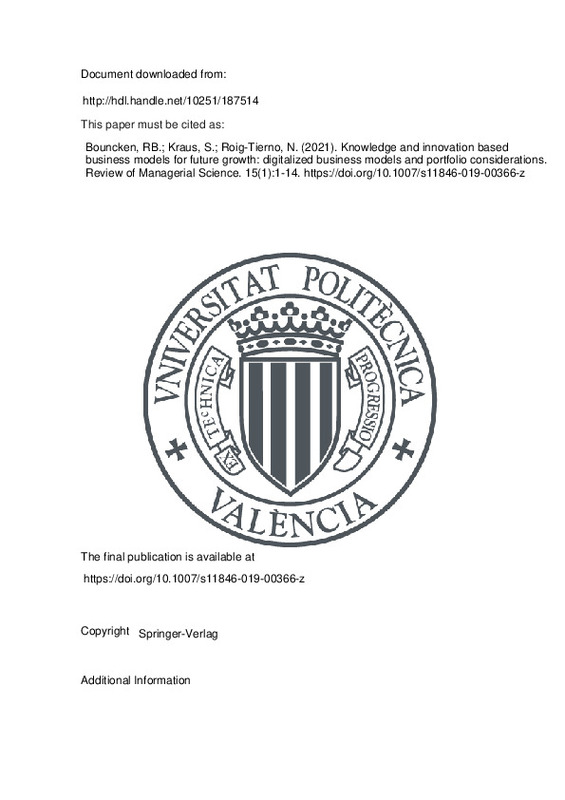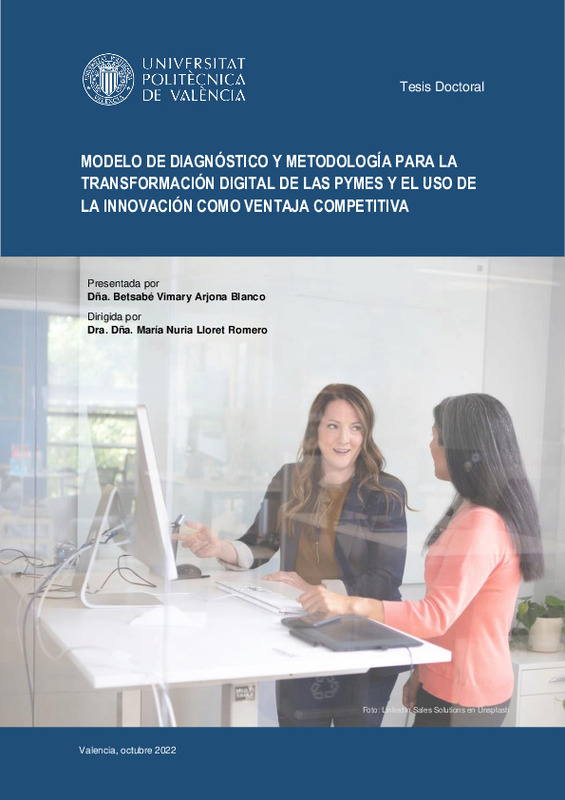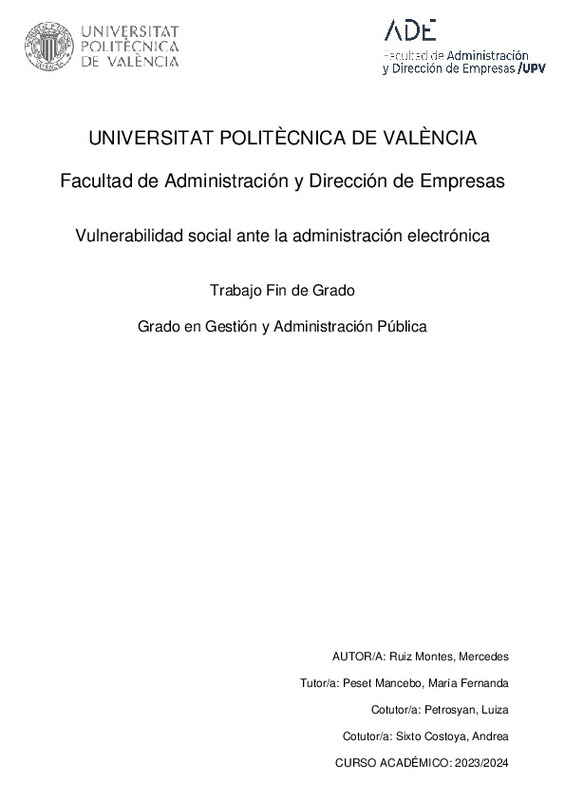Achtenhagen L, Melin L, Naldi L (2013) Dynamics of business models—strategizing, critical capabilities and activities for sustained value creation. Long Range Plan 46:427–442. https://doi.org/10.1016/j.lrp.2013.04.002
Amit R, Zott C (2001) Value creation in e-business. Strateg Manag J 22:493–520
Amit R, Zott C (2015) Crafting business architecture: the antecedents of business model design. Strateg Entrep J 4:331–350
[+]
Achtenhagen L, Melin L, Naldi L (2013) Dynamics of business models—strategizing, critical capabilities and activities for sustained value creation. Long Range Plan 46:427–442. https://doi.org/10.1016/j.lrp.2013.04.002
Amit R, Zott C (2001) Value creation in e-business. Strateg Manag J 22:493–520
Amit R, Zott C (2015) Crafting business architecture: the antecedents of business model design. Strateg Entrep J 4:331–350
Andries P, Debackere K, van Looy B (2013) simultaneous experimentation as a learning strategy: business model development under uncertainty. Strateg Entrep J 7:288–310. https://doi.org/10.1002/sej.1170
Baden-Fuller C, Haefliger S (2013) Business models and technological innovation. Long Range Plan 46:419–426. https://doi.org/10.1016/j.lrp.2013.08.023
Baden-Fuller C, Mangematin V (2013) Business models: a challenging agenda. Strateg Organ 11:418–427
Berends H, Smits A, Reymen I, Podoynitsyna K (2016) Learning while (re) configuring: business model innovation processes in established firms. Strateg Organ. https://doi.org/10.1177/1476127016632758
Bouncken RB, Aslam MM (2019) Understanding knowledge exchange processes among diverse users of Coworking-spaces. J Knowl Manag. https://doi.org/10.1108/JKM-05-2018-0316
Bouncken R, Barwinski R (2020) Shared Digital Identity and Rich Knowledge Ties in Global 3D Printing – A Drizzle in the Clouds? Glob Strategy J (forthcoming)
Bouncken RB, Fredrich V (2016) Business model innovation in alliances: successful configurations. J Bus Res 69:3584–3590. https://doi.org/10.1016/j.jbusres.2016.01.004
Bouncken RB, Reuschl AJ (2018) Coworking-spaces: how a phenomenon of the sharing economy builds a novel trend for the workplace and for entrepreneurship. Rev Manag Sci 12:317–334. https://doi.org/10.1007/s11846-016-0215-y
Bouncken RB, Komorek M, Kraus S (2014) Crowdfunding: the current state of research. Int Bus Econ Res J 14:407–414
Bouncken RB, Fredrich V, Ritala P, Kraus S (2018a) Coopetition in new product development alliances: advantages and tensions for incremental and radical innovation. Br J Manag 29:391–410. https://doi.org/10.1111/1467-8551.12213
Bouncken RB, Laudien SM, Fredrich V, Görmar L (2018b) Coopetition in coworking-spaces: value creation and appropriation tensions in an entrepreneurial space. Rev Manag Sci 12:385–410. https://doi.org/10.1007/s11846-017-0267-7
Bouncken RB, Fredrich V, Kraus S (2019a) Configurations of firm-level value capture in coopetition. Long Range Plan. https://doi.org/10.1016/j.lrp.2019.02.002
Bouncken RB, Klement S, Pesch R (2019b) Additive manufacturing alliances—Dienstleistungskooperationen in der 3D-Druck Branche. Springer, Wiesbaden
Brand M, Tiberius V, Bican PM, Brem A (2019) Agility as an innovation driver: towards an agile front end of innovation framework. Rev Manag Sci
Casadesus-Masanell R, Ricart JE (2010) From strategy to business models and onto tactics. Long Range Plan 43:195–215. https://doi.org/10.1016/j.lrp.2010.01.004
Casadesus-Masanell R, Zhu F (2013) Business model innovation and competitive imitation: the case of sponsor-based business models. Strateg Manag J 34:464–482. https://doi.org/10.1002/smj.2022
Castellani P, Rossato C, Giaretta E, Davide R (2019) Tacit knowledge sharing in knowledge-intensive firms: the perception of team members and team leaders. Rev Manag Sci
Cennamo C (2019) Competing in digital markets: a platform-based perspective. Acad Manag Perspect. https://doi.org/10.5465/amp.2016.0048
Cho TS, Hambrick DC (2006) Attention as the mediator between top management team characteristics and strategic change: the case of airline deregulation. Organ Sci 17:453–469. https://doi.org/10.1287/orsc.1060.0192
Clauss T, Harengel P, Hock M (2018a) The perception of value of platform-based business models in the sharing economy: determining the drivers of user loyalty. Rev Manag Sci. https://doi.org/10.1007/s11846-018-0313-0
Clauss T, Kesting T, Naskrent J (2018b) A rolling stone gathers no moss: the effect of customers’ perceived business model innovativeness on customer value co-creation behavior and customer satisfaction in the service sector. R&D Manag. https://doi.org/10.1111/radm.12318
Clauss T, Abebe M, Tangpong C, Hock M (2019a) Strategic agility, business model innovation, and firm performance: an empirical investigation. IEEE Trans Eng Manag. https://doi.org/10.1109/tem.2019.2910381
Clauss T, Bouncken RB, Laudien S, Kraus S (2019b) Business model reconfiguration and innovation in SMEs: a mixed-method analysis from the electronics industry. Int J Innov Manag. https://doi.org/10.1142/s1363919620500152
Colbert A, Yee N, George G (2016) The digital workforce and the workplace of the future. Acad Manag J 59:731–739. https://doi.org/10.5465/amj.2016.4003
Demil B, Lecocq X, Ricart JE, Zott C (2015) Introduction to the SEJ special issue on business models: business models within the domain of strategic entrepreneurship. Strategic Entrep J 9:1–11. https://doi.org/10.1002/sej.1194
Devece C, Palacios-Marqués D, Ribeiro-Soriano DE (2019) IT-based strategy, capabilities, and practices: crowdsourcing implementation in market-oriented firms. Rev Manag Sci
Foss NJ, Saebi T (2017) Fifteen years of research on business model innovation: how far have we come, and where should we go? J Manag 43:200–227
Frankenberger K, Weiblen T, Csik M, Gassmann O (2013) The 4I-framework of business model innovation: a structured view on process phases and challenges. Int J Prod Dev 18:249–273
Fredrich V, Bouncken RB, Kraus S (2019) The race is on: configurations of absorptive capacity, interdependence and slack resources for interorganizational learning in coopetition alliances. J Bus Res 101:862–868. https://doi.org/10.1016/j.jbusres.2018.11.038
Garcia De Lomana G, Strese S, Brinckmann J (2019) Adjusting to the digital age: the effects of TMT characteristics on the digital orientation of firms. Acad Manag Proc 2019:13589. https://doi.org/10.5465/AMBPP.2019.13589abstract
Ghezzi A, Cavallo A (2018) Agile business model innovation in digital entrepreneurship: lean startup approaches. J Bus Res. https://doi.org/10.1016/j.jbusres.2018.06.013
Grewal D, Puccinelli N, Monroe KB (2018) Meta-analysis: integrating accumulated knowledge. J Acad Mark Sci 46:9–30. https://doi.org/10.1007/s11747-017-0570-5
Grigoriou K, Rothaermel FT (2017) Organizing for knowledge generation: internal knowledge networks and the contingent effect of external knowledge sourcing. Strateg Manag J 38:395–414. https://doi.org/10.1002/smj.2489
Haas MR, Criscuolo P, George G (2015) Which problems to solve? Online knowledge sharing and attention allocation in organizations. Acad Manag J 58:680–711. https://doi.org/10.5465/amj.2013.0263
Hamari J, Sjöklint M, Ukkonen A (2016) The sharing economy: why people participate in collaborative consumption. JASIST 67:2047–2059. https://doi.org/10.1002/asi.23552
Hora W, Gast J, Kailer N, Rey-Marti A, Mas-Tur A (2018) David and Goliath: causes and effects of coopetition between start-ups and corporates. Rev Manag Sci 2:411–439
Hughes M, Rigtering JPC, Covin JG, Bouncken RB, Kraus S (2018) Innovative behaviour, trust and perceived workplace performance. Br J Manag 29:750–768. https://doi.org/10.1111/1467-8551.12305
Humberd BK, Rouse ED (2016) Seeing you in me and me in you: personal identification in the phases of mentoring relationships. Acad Manag Rev 41:435–455. https://doi.org/10.5465/amr.2013.0203
Kohli R, Melville NP (2019) Digital innovation: a review and synthesis. Inf Syst J 29:200–223. https://doi.org/10.1111/isj.12193
Kraus S, Bouncken RB, Eggers F, Schüßler F, Meier F (2016) Standardisation vs. adaption: a conjoint experiment on the influence of psychic, cultural and geographical distance on international marketing mix decisions. Eur J Int Manag 10:127–156
Kraus S, Palmer C, Kailer N, Kallinger FL, Spitzer J (2019a) Digital entrepreneurship: a research agenda on new business models for the twenty-first century. Int J Entrep Behav Res 25:353–375. https://doi.org/10.1108/IJEBR-06-2018-0425
Kraus S, RoigTierno N, Bouncken RB (2019b) Digital innovation and venturing: an introduction into the digitalization of entrepreneurship. Rev Manag Sci 13:519–528. https://doi.org/10.1007/s11846-019-00333-8
Laamanen T, Pfeffer J, Rong K, Van de Ven A (2018) Editors’ Introduction: business models, ecosystems, and society in the sharing economy. Acad Manag Discov 4:213–219. https://doi.org/10.5465/amd.2018.0110
Lanzolla G, Lorenz A, Miron-Spektor E, Schilling M, Solinas G, Tucci C (2018) Digital transformation: what is new if anything? Acad Manag Discov 4:378–387. https://doi.org/10.5465/amd.2018.0103
Markides CC (2013) Business model innovation: what can the ambidexterity literature teach us? Acad Manag Perspect 27:313–323
Martins LL, Rindova VP, Greenbaum BE (2015) Unlocking the hidden value of concepts: a cognitive approach to business model innovation. Strateg Entrep J 9:99–117. https://doi.org/10.1002/sej.1191
Massa L, Tucci CL, Afuah A (2017) A critical assessment of business model research. Acad Manag Ann 11:73–104. https://doi.org/10.5465/annals.2014.0072
McGrath RG (2010) Business models: a discovery driven approach. Long Range Plan 43(2–3):247–261
Medina-Molina C, Rey-Moreno M, Felício JA, Romano Paguillo I (2019) Participation in crowdfunding among users of collaborative platforms: the role of innovativeness and social capital. Rev Manag Sci. https://doi.org/10.1007/s11846-019-00329-4
Miranda S, Cunha P, Duarte M (2019) An integrated model of factors affecting consumer attitudes and intentions towards youtuber-generated product content. Rev Manag Sci—Draft
Morkunas VJ, Paschen J, Boon E (2019) How blockchain technologies impact your business model. Bus Horiz 62:295–306. https://doi.org/10.1016/j.bushor.2019.01.009
Morris M, Schindehutte M, Allen J (2005) The entrepreneur’s business model: toward a unified perspective. J Bus Res 58:726–735. https://doi.org/10.1016/j.jbusres.2003.11.001
Muhic M, Bengtsson L (2019) Dynamic capabilities triggered by cloud sourcing—a stage-based model of business model innovation business model innovation. Rev Manag Sci
Muñoz-Pascual L, Curado C, Galende J (2019) How does the use of information technologies affect the adoption of environmental practices in SMEs? A mixed-methods approach. Rev Manag Sci
Nambisan S, Lyytinen K, Majchrzak A, Song M (2017) Digital innovation management: reinventing innovation management research in a digital world. MIS Q 41:223–238
Ocasio W, Laamanen T, Vaara E (2018) Communication and attention dynamics: an attention-based view of strategic change. Strateg Manag J 39:155–167
O’Leary DE (2013) Artificial intelligence and big data. IEEE Intell Syst 28:96–99
Osiyevskyy O, Dewald J (2015) Explorative versus exploitative business model change: the cognitive antecedents of firm-level responses to disruptive innovation. Strateg Entrep J 9:58–78. https://doi.org/10.1002/sej.1192
Pesch R, Bouncken RB (2018) How to achieve benefits from diversity in international alliances: mechanisms and cultural intelligence. Glob Strategy J 8:275–300
Pierscieniak A, Krawczyk-Sokolowska I (2019) The innovation potential of the enterprise in the context of the economy and the business model. Rev Manag Sci
Pinazo-Dallenbach P, Mas-Tur A, Lloria B (2016) Using high-potential firms as the key to achieving territorial development. J Bus Res 4:1412–1417
Probst L, Röglinger M, Faisst U (2018) Structuring digital transformation: a framework of action fields and its application at ZEISS. J Inf Technol Theory Appl 19:31–54
Ribeiro-Soriano D, Kraus S (2018) An overview of entrepreneurship, innovation and sensemaking for improving decisions. Group Decis Negot 27:313–320. https://doi.org/10.1007/s10726-018-9569-7
Richter C, Kraus S, Bouncken RB (2015a) Virtual currencies like bitcoin as a paradigm shift in the field of transactions. Int Bus Econ Res J 14:575
Richter C, Kraus S, Syrjä P (2015b) The shareconomy as a precursor for digital entrepreneurship business models. Int J Entrep Small Bus 25:18–35
Richter C, Kraus S, Brem A, Durst S, Giselbrecht C (2017) Digital entrepreneurship: innovative business models for the sharing economy. Creat Innov Manag 26:300–310
Ritala P, Golnam A, Wegmann A (2014) Coopetition-based business models: the case of Amazon.com. Ind Mark Manag 43:236–249. https://doi.org/10.1016/j.indmarman.2013.11.005
Roy R, Sarkar MB (2016) Knowledge, firm boundaries, and innovation: mitigating the incumbent’s curse during radical technological change. Strateg Manag J 37:835–854. https://doi.org/10.1002/smj.2357
Sohl T, Govert Vroom, Fitza M (2018) How much does business model matter for firm performance? A variance decomposition analysis. Acad Manag Discov. https://doi.org/10.5465/amd.2017.0136
Sosna M, Trevinyo-Rodríguez RN, Velamuri SR (2010) Business model innovation through trial-and-error learning: the Naturhouse case. Long Range Plan 43:383–407
Soublière J-F, Joel G (2019) The legitimacy threshold revisited: how prior successes and failures spill over to other endeavors on kickstarter. Acad Manag J 1:1. https://doi.org/10.5465/amj.2017.1103
Suddaby R, Bitektine A, Haack P (2017) Legitimacy. Acad Manag Ann 11:451–478. https://doi.org/10.5465/annals.2015.0101
Sullivan BN (2010) Competition and beyond: problems and attention allocation in the organizational rulemaking process. Organ Sci 21:432–450. https://doi.org/10.1287/orsc.1090.0436
Tallman S, Luo Y, Buckley PJ (2018) Business models in global competition. Glob Strategy J 8:517–535. https://doi.org/10.1002/gsj.1165
Teece DJ (2010) Business models, business strategy and innovation. Long Range Plan 43(2–3):172–194
Teece DJ, Linden G (2017) Business models, value capture, and the digital enterprise. J Organ Des 6:8
Tuggle CS, Schnatterly K, Johnson RA (2010) Attention patterns in the boardroom: how board composition and processes affect discussion of entrepreneurial issues. Acad Manag J 53:550–571
v. Alberti-Alhtaybat L, Al-Htaybat K, Hutaibat K (2019) A knowledge management and sharing business model for dealing with disruption: the case of Aramex. J Bus Res 94:400–407. https://doi.org/10.1016/j.jbusres.2017.11.037
Wang Q, Myers MD, Sundaram D (2013) Digital natives and digital immigrants, Business & Information. Syst Eng 5:409–419. https://doi.org/10.1007/s12599-013-0296-y
Yoo Y, Boland RJ Jr, Lyytinen K, Majchrzak A (2012) Organizing for innovation in the digitized world. Organ Sci 23:1398–1408
Yu J, Engleman RM, Van de Ven AH (2005) The integration journey: an attention-based view of the merger and acquisition integration process. Organ Stud 26:1501–1528
Zammuto RR, Griffith T, Majchrzak A, Dougherty D, Faraj S (2007) Information technology and the changing fabric of organization. Organ Sci 18:749–762. https://doi.org/10.1287/orsc.1070.0307
Zott C, Amit R (2010) Business model design: an activity system perspective. Long Range Plan 43:216–226
[-]







![[Cerrado]](/themes/UPV/images/candado.png)





